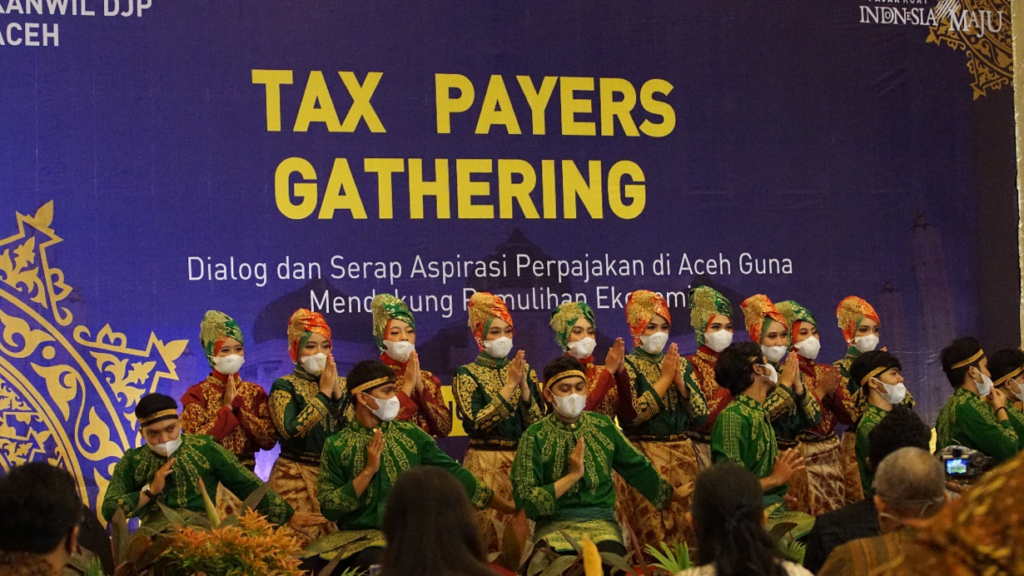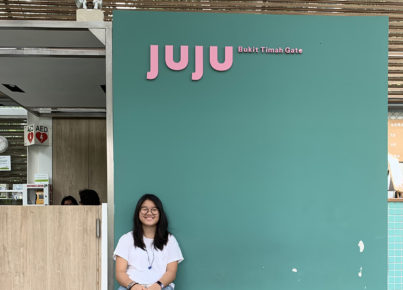“The Importance Of Being Aware Of Taxes To Achieve The Country’s Development Targets”
Hana Delia Sowiyk
Civil Servant
Indonesia
Sustainable Development Goals (SDGs) are a continuation agenda of the Millennium Development Goals (MDGs) which were released by the United Nation (UN) on September 25, 2015. It was a global action plan which was agreed by many nations’ leaders including Indonesia’s. SDGs have 17 goals and 169 targets and will be used as guidelines for all these bound policies. Also it will be used in funding for the next 15 years, that are expected to be achieved by 2030. SDGs are integrated. But basically, it focuses at three major things that are environment, social and economic.
In Indonesia, sustainable development is a big concern and has been carried out. As example, there is a national program for funding every village in this nation. “Dana Desa” is how Indonesian government named it. Since 2014, Indonesian government released the legal regulations about “Dana Desa” in the form of constitution number 6 in 2014 and choose 2015 as the first year to actualize it. This village funding program is expected to improve welfare and the quality of Indonesia humans’ life especially the people who live in villages. The allocation of this fund is expected to be something that can raise the regions which are hard to be developed.
Another example is the construction of transportation infrastructure. The legal law of it was released in the same year as the funding village that we have talked about before. In July, 14th 2014 Indonesian president released the President Decree number 75 which is about Provision Acceleration of Priority Infrastructure. This decree is about development that aims to facilitate access to The Least Developed, Frontier and Outermost regions or in Indonesia it commonly known as 3T (Tertinggal, Terdepan, dan Terluar) regions. This ease of access is expected to open up the new economic space, especially for the local society like making their regions as tourist destination.
Of course massive development requires a large source of state revenue as well. Through the Ministry of Finance, Indonesian government controls like collection, utilization, and management of state property. In Indonesia nation’s fund is collect from three source which are Tax, Custom and Excise, and Non-tax revenue. Currently, the source of Indonesia’s state income is dominated by Tax. In 2019, from Rp1,957.2 trillion of realized state revenue, realized tax revenue reached 1,545.3 trillion or around 86.5% of the revenue. So we can see that the fact, taxes are the main source of revenue for the Indonesian state. That is one of the reasons why taxes have a very large role in the country’s development.
Unfortunately, even a legal role does not necessarily make people obedient. This can be seen from Indonesia’s tax ratio which is still low, that is standing around 10.6% per 2019. Indonesia’s tax ratio is one of the lowest in ASEAN countries. Tax ratio itself means the ratio of state tax revenue to gross domestic product (GDP). From the tax ratio, the state will get a general picture of tax conditions and can assess the ability of taxes to realize fair development and reduce economic disparities between regions.
There are 2 factors that can affect a country’s tax ratio known as macro factors and micro factors. Macro factors consist of several things like the tax regulation, per capita income, and the governments implementations. The micro factors themselves consist of the level of taxpayer compliance, coordination between state institutions related to taxes, and common perceptions between the public and tax officials. It still found in majority of Indonesian that tax is something troublesome themselves. In fact, it is not like what they think. Form the Indonesian Constitution number 28 in 1983 says that All of the collected tax will be used only for nation’s welfare. So that Indonesia government choose to include tax education for Indonesian through Indonesia Directorate General of Taxation which the main office is located at Gatot Subroto street No. 7, Senayan, South Jakarta City, Indonesia. This tax education is designed consecutively from the main office, Regional Tax Offices, Tax Office, and Tax Services, Dissemination and Consultation Office. The offices that is making direct contact with taxpayer are the last two. And know I am working in one of the tax office types scilicet Aceh Besar Tax Office.
My office, Aceh Besar Tax Office (Kantor Pelayanan Pajak Pratama Aceh Besar), is located in Tengku Muhammad Daud Beureueh No. 53rd, Banda Aceh City. Even my office is located in Banda Aceh, our work region is not Banda Aceh, but consists of three other regions which are Aceh Besar district, Pidie district, and Sabang island. In my office, I work at the “Pengawasan dan Konsultasi I” section, that actually making direct contact with taxpayer especially in consultation about all tax-things. We are one of several section that directly educate taxpayer and see the implementation of regulations, especially regarding taxation, in the society. Of course, not all regulations are well accepted by taxpayer, there are many pros and cons from them.
Annual tax return is one of many things that we concern in educating taxpayer. We even made a seminar which is devoted for State General Treasures because they will make the tax collection every time they use the money that they get from State Budget for taxable goods or taxable services, and released the tax withholding slip for it.
We also do the private consultation for the taxpayer who want it, for their company’s or even their own tax problems. Of course there are so many negative responses that we get from them. It is because what we have talked before that many people in Indonesia think the tax which they pay will only use for government goods like being corrupted. But Indonesia Directorate General of Taxation has done the clean-up for the corruption in the institution. There are so many strict regulations that prevents their officials for doing corruption. Indonesia Directorate General of Taxation even make Whistleblowing System, a program that make the officials can report whoever in the institution that they know has done a corruption and will get gift for it.
Even after I tell them about that, still there are a lot of negative thoughts about us. But I try to understand that because from almost taxpayer that come to my office, there are so many of them who still don’t use or even know about the internet. This is also one of the main problems I have in educating taxpayer about the tax things that use computerized and internet. The ignorance about internet makes it hard for them to learn by themselves, even less for the updated regulations especially about taxation. Because of that our office decides that making direct consultation forum like seminar will be the best solution to educate the taxpayer. We can update them with the newest tax regulation from our institution and they can get the solutions for their problems in the same day. So that is what I do in my job which the essence is educating the people to become the good taxpayers and together realize the sustainable development in Indonesia. Maybe it doesn’t help too much but I wish our hard work will result the good taxpayer’s awareness about how important the tax for their country.
持続可能な開発目標(SDGs)とは、2015年9月25日に国連(UN)が発表したミレニアム開発目標(MDGs)の継続的な課題です。それは、インドネシアをはじめとする多くの国の首脳が合意した世界的な行動計画です。SDGsには17の長期的目標と169の短期的目標があり、全ての政策の指針として活用されます。また、2030年までに達成されることが期待されている15年間の資金調達にも活用されます。SDGsは統合されています。しかし、基本的には環境、社会、経済の3つに焦点を当てています。
インドネシアにおいて、持続可能な開発は大きな関心事であり実施されています。例えば、この国には、すべての村に資金を提供するという国家的なプログラムがあります。それは、「ダナ・デサ」と呼ばれ、はインドネシア政府が名付けました。インドネシア政府は2014年に憲法第6条で「ダナ・デサ」に関する法的規制を発表し、2015年を初年度として、法に効力を持たせました。この村落基金プログラムは、インドネシアの人々、特に村落に住む人々の福祉と生活の質を改善することが期待されています。開発されにくい地域を底上げできるように基金が配分されることもまた期待されています。
もう一つの例は、交通インフラの整備です。先ににお話した村落基金プログラムが制定されたのと同じ年に、交通インフラ整備についての法制化が発表されました。 2014 年 7 月にインドネシアの大統領が大統領令 75 号を発表しました。この法令には、優先的なインフラ整備を促進させる条項が含まれています。これは、インドネシアでは3T地域(テルティンガル、テルデパン、ダン・テルルアール)として一般的に知られる、最も開発が遅れている未開拓地へのアクセスを整備するための法令です。これらの地域にアクセスできるようになることで、経済に良い影響がでると言われています。特に未開の地を観光地化することが期待されています。
もちろん、大規模な開発には大規模な財源が必要です。財務省を通じて、インドネシア政府は国有財産の収集、活用、および運営などの管理を行います。インドネシアでは国家の資金は、税、関税と物品税、および非課税収益の3つの財源から収集されています。現在、インドネシアの国家収入の財源は、税金によるものの割合が最も高いです。2019年には、1,957.2兆ルピアの国家的実益歳入がありました。そのうち1545.3兆ルピアが税金からのものです。これは、国家の実益歳入の86.5%を占めています。このことから、税金がインドネシア国家の主な歳入源であることがわかります。これが、税金が国の発展に非常に大きな役割を果たしている理由の一つです。
残念ながら、法的な役割があるからといって、必ずしも人々が従順になるわけではありません。これは、2019年あたり10.6%前後である、まだ低いインドネシアの課税率から見ることができます。インドネシアの課税率は、ASEAN諸国の中でも最も低い部類に入ります。税率そのものは、国内総生産(GDP)に対する州の税収の割合を意味します。税率から国家は税の状況を全体的に把握しその税を使って何ができるかを評価します。そして、公平な発展を実現したり、地域間の経済格差を縮小したりするのです。
税率に影響を与える要因には、マクロ要因とミクロ要因と呼ばれる2つの要因があります。マクロ要因とは、税金の規制、一人当たりの所得、政府の施策などで構成されています。ミクロ要因自体は、納税者のコンプライアンスのレベル、税金に関連する国家機関内での調整、国民と税務当局者の間の共通認識から構成されています。インドネシア人の大多数は、税金は厄介なものであるという認識を持っています。実際には、税金とは人々が考えているようなものではありません。1983年に制定されたインドネシア憲法28条によると、徴収された税金はすべて国家の福祉のためにのみ使用されるとされています。そこでインドネシア政府は、インドネシアの南ジャカルタ市セナヤンのGatot Subroto通りNo.7にメインオフィスがあるインドネシア税務総局を通じて、インドネシア人のための租税教育を行うことにしました。この租税教育は、本庁、地方税務署、税務署、税務サービス・普及・相談室が一貫して行うように企画されています。納税者と直接コンタクトを取っている事務所は最後の2つです。そして、私はアチェ・ブサル税務署で現在勤務しています。
私の事務所であるアチェ・ブサル税務署は、Tengku Muhammad Daud Beureueh No. 53rd, Banda Aceh Cityにあります。私のオフィスはバンダアチェにありますが、私たちの勤務地はバンダアチェではなく、アチェブサル地区、ピディ地区、サバン島の3つの地域になります。私は「Pengawasan dan Konsultasi I」という部署で働いています。この部署では、納税者と直接連絡をとったり、特に税金に関するすべての相談を受け付けたりしています。また、納税者の教育や、特に税金に関する規制の実施の監督も行っています。もちろん、すべての規制が納税者に受け入れられるわけではありません。納税者からは賛成の声も反対の声も多く聞かれます。
毎年の確定申告は、私たちが納税者を教育する上で気を配っていることの一つです。私たちは州の会計係のためにセミナーを催すこともあります。なぜならば、国家から得た予算で課税対象の商品を買ったりサービスを受けたりした場合、その都度、税金を徴収しているので、源泉徴収票を公開するのです。
また、希望者には個人的な相談事業も行っています。相談内容は、自分の会社に関することでも、相談者自身の税金に関することでもよいのです。もちろん、その方たちからの否定的な反応もたくさんあります。それは、インドネシアの多くの人々が、彼らが支払う税金が、腐敗した政府によって不適切に使われていると思っているからです。しかし、インドネシア税務総局は、機関内の腐敗を一掃しています。職員が汚職を行えないよう、多くの厳格な規制があります。インドネシア税務総局は、内部告発制度を作りました。これは、職員が汚職を行った機関内の職員を報告することができ、その後贈り物を受けることができる制度です。
その話をしても、私たちのことを否定的に捉えている人が多いです。しかし、事務所に来る納税者の中には、まだインターネットを使っていない人やインターネットを知らない人が多いので、こちらの行っている取り組みが十分に周知されていないことを理解するようにしています。
これは納税教育を行う上でも問題になっています。なぜならば、納税教育ではコンピュータやインターネットを使うからです。インターネットの知識がないがために、納税者が自分で学ぶことは難しく、特に税務に関する最新の法規制を知ることができません。そこで、当事務所では、セミナーのような直接相談の場を設けることが納税者を教育するための最良の解決策であると考えています。私たちは、納税者に最新の税務法規を伝えることで、その日のうちに問題解決の糸口を掴んでもらうようにしています。
私の仕事は、インドネシアの持続可能な発展を一緒に実現するために、人々がよき納税者となれるように教育することです。あまり役に立たないかもしれませんが、私たちの努力の結果、納税者に、国にとって税金がいかに重要かという意識を持ってもらえることを願っています。








